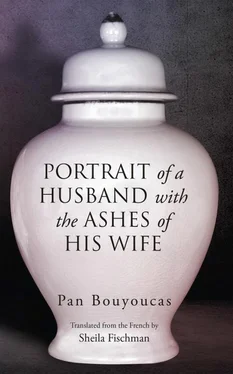Idiot! he thinks to himself now. Would Groslin have re-engaged her?
After he’s changed his return date, he goes to the 6th arrondissement, to the Hôtel Saint-André-des-Arts where Alma had stayed the first time she had worked in Paris. Like the Théâtre national de Chaillot, the hotel is unchanged since the days some years later when Alma had brought her husband there to show it to him.
She had told him:
“Pauline was in the cast and she stayed here too. At night, when we came back from the theatre we’d stop at the gelateria on rue de Buci for an ice cream cone before we went up to bed. You must try it, Alexandre, it’s the best in the world.”
The gelateria is still there, fifty metres away. But when Doctor Maras sits down at the café across the street, instead of seeing Alma and Pauline lined up for a cone after a performance, he sees them going directly up to their room on the arms of Serge Groslin.
He isn’t angry with her for that: He and Alma hadn’t met yet. He is angry with her for having hidden from him that she loved Groslin and having returned to Paris two years after their marriage to perform in his first feature film.
Come to think of it, even when she was working outside of Montreal she would call him every night to tell him about her day, imagining like all actors that the entire world would find it fascinating. But though he searches his memory he can’t find the slightest reference to Groslin’s first film. Why? Was she who lied so badly in real life afraid of giving away her feelings? Unless she was much less honest than she seemed and only revealed to him certain fragments of what she did and thought, which amounts to a kind of lie, doesn’t it?
All things considered, Franck was right: The woman whose table and bed he had shared for twenty-four years had never truly opened the doors to her heart, never truly let him into her other garden, the secret one. It was as though her status as spouse were merely another role she was playing, and today he chokes at the thought that every time she looked at him she could tell herself: You can see me, hear me, you can even enter my body but never will you be able to enter my mind.
Perhaps if he didn’t go to bed so early at night…
Alma always came home from performances overcharged and needing to talk while he, as a surgeon, had to get up every morning at five o’clock, perfectly rested.
How she must have missed while he was snoring not being with someone in her line of work, like Groslin, who’d have taken her for an ice cream after the theatre and listened to her recount her joys and anxieties all night…
He looks back at the gelateria across the street and now sees a mockery in every detail, from its name, Amorino, to the little cupid that symbolized its products, even in the way of eating the cones.
“I wanted so badly for my sister to see Paris too,” says an American woman at the next table.
“Why didn’t she come with you?” asks her female companion.
“She can’t, poor thing, her husband is still alive.”
Doctor Maras pays his bill and walks away, head bowed, and after walking for an hour ends up at Père-Lachaise cemetery where, with a map in hand and a lump in his throat, he visits the graves of Jim Morrison, Molière, Sarah Bernhardt and Edith Piaf, ending up at the columbarium, convinced that Groslin himself had photographed Alma and Pauline here and that on that day he and Alma had sworn to join each other there for eternity. And tomorrow, the director was going to confirm it to him.
Fortunately, he still has Mélissa.
Unless…
A thought takes hold of him, one of those thoughts that break a man for life. To check it, he takes out his pen and jots two dates on the back of his plane ticket so he can accurately calculate the number of months between Alma’s return from Paris after shooting Groslin’s first film and the birth of their daughter.
“Watch out, Monsieur,” shouts a teenager passing by with his buddies. “Every year a hundred people choke to death on their pens.”
His friends split their sides laughing. In other circumstances, Doctor Maras would have laughed too. This time, he rushes to the exit, gasping for breath even though he’s in the open air.
When he is finally back at his sister’s, no sooner has he crossed the threshold than Franck returns to the attack.
“So, Ninon Conti? Did you go?”
“No.”
“What a masochist!”
Doctor Maras nods, then shuts himself inside the guest room.
The urn sits on the bedside table. He looks at it and has the impression that he is gazing at the ashes of his life.
 21
21 
BE BRAVE, HEtells himself on Tuesday, as he leaves his sister’s apartment. You must learn to accept things as they are. Nothing lasts forever. Be brave, he tells himself again as he enters the café where Serge Groslin is waiting for him, tanned, alert, and as slim and graceful at sixty as a young tennis champion. Surely, he thinks, Mélissa would be more proud of a father so handsome, so talented, so famous…
“Doctor, my deepest sympathy.”
Doctor Maras thanks him, then explains without further ado why he has come to Paris.
“How touching,” Groslin says. “To look for the place where one’s beloved has been happiest and leave her ashes there. And you didn’t tell my wife on the phone to spare me. Your kindness touches me deeply. But I assure you, between Alma and me there was only friendship. And on my part, tremendous admiration for her talent, her intelligence and that rare and magical gift of hers: presence. For her courage too. Because it takes courage and great strength of character when, after people have praised you to the skies, they turn their backs on you. And so when I found out in Montreal that she was no longer working, I didn’t hesitate to offer her a part in my upcoming film.”
“When was it going to be shot?”
“Next spring.”
He’s not even surprised that I don’t know, thinks Doctor Maras as Groslin shakes his head and says:
“What a pity. She was wild about the subject too because she thought it was unacceptable that in the twentyfirst century, the past could still poison our present and threaten our future as it is doing in so many countries. That must stop. People should learn once and for all that we cannot advance by constantly looking back. Otherwise I feel sorry for children in the year 3000 who’ll have another thousand years of resentments to deal with.”
Why is he telling him all that? Doctor Maras knows, from having lived with an actress and become familiar with her circles, those people get carried away easily and can talk about the project they’re working on as if it were the most fascinating thing in the world. But Groslin puts too much emphasis on the words past and stop for it to be idle chatter. Doctor Maras lets him hold forth then on the different theatres of war and extermination throughout the world, analyzing every one of his sentences, every intonation. But despite his seeming affability, the other man is still vague and Doctor Maras is no further ahead when Groslin has finished demonstrating that the most highly developed countries are those that pay the least tribute to the past. Now, his tirade finished, he looks at his watch and asks for the bill. Doctor Maras concludes then that the man has told him everything that had driven him to write his screenplay, either to point out, without taunting him, that the world was being torn apart by war and there was no reason to be troubled over a personal drama so insignificant compared with those of thousands of other people, or quite simply to prevent him from asking questions, and now he was going to dash on the pretext that more important matters awaited him.
Читать дальше

 21
21 











